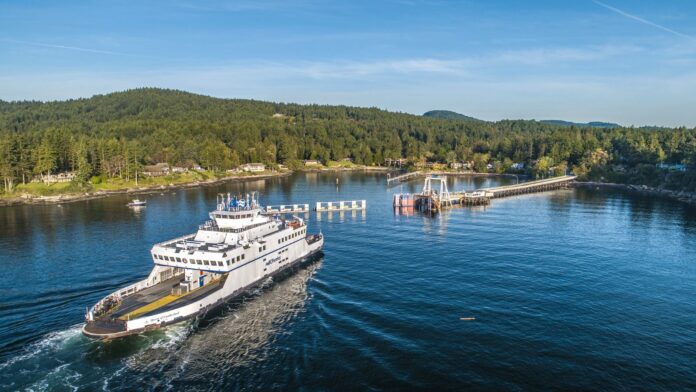B.C. Ferries’ decision to award a major shipbuilding contract to a Chinese company is drawing fire from the province’s Opposition Conservatives.
The company announced Tuesday it had selected China Merchants Industry Weihai Shipyard to build four diesel-battery hybrid vessels to replace its oldest ferries.
“It was the clear choice based on the overall strength of its bid,” CEO Nicolas Jimenez said in a statement.
The Conservatives are calling on the NDP government to intervene and prevent the deal.
“It puts British Columbia’s economy and Canada’s security at risk, at a time when tariffs and trade tension with China are at the top of the national and international agenda,” the Conservatives said in a news release Wednesday.
B.C. Conservative Leader John Rustad accused Premier David Eby of “abandoning Canadian workers” by awarding the contract to a Chinese state-owned company.
CMI Weihai is owned by the Hong Kong-based China Merchants Group, which describes itself as a state-owned enterprise.
Transport Minister Mike Farnworth noted in a statement that B.C. Ferries is an independent company and makes its own operational decisions. He said the new vessels are needed but added he is “disappointed” more Canadian shipyards were not part of the contract.
“My hope is that going forward, B.C. Ferries will make a greater effort to require Canadian inputs into its new vessels,” Farnworth said.
B.C. Ferries said CMI Weihai was chosen after proposals were assessed based on risk, quality, environmental standards, cost and timelines.
Ed Hooper, head of fleet renewal, said B.C. Ferries will have its own team of shipbuilding experts on site during construction “to provide ongoing oversight and quality assurance.”
The company did not disclose the price of the contract, saying doing so could compromise its ability to secure competitive bids in the future. It said the contract is within the approval limits set by the B.C. Ferries commissioner.
Mike Corrigan, CEO of Interferry, an association representing the global ferry industry, said most of its members turn to Chinese shipbuilders.
“There are only a few remaining shipyards outside of China that still have the desire, expertise and/or infrastructure required to build large, complex ferries,” Corrigan said in a statement.
B.C. Ferries said that while the vessels are being built overseas, it expects to invest more than $230 million locally on maintenance and operations over the first 10 years of their use.
The company said there is an urgent need to modernize its aging fleet, with several vessels nearing or past their operational lifespans, including the more than 60-year-old Queen of New Westminster. It said the older ferries require more complex maintenance and are more prone to issues that can take them out of service during peak sailing seasons.
The new vessels will have more than 50 per cent more passenger space and 24 per cent more space for vehicles. They will include accessible walkways and elevators, and quieter propellers to reduce noise impacts on whales and other marine life.
Ten new ferries have been added to B.C. Ferries’ fleet since 2016. Four Salish-class vessels were built by Remontowa Shipbuilding in Poland, while Netherlands-based Damen Shipyards Group built six Island-class vessels and will deliver four more by 2027.
The first of the new major vessels is expected to enter service in 2029.
Be the first to know! Don’t miss out on breaking news and daily updates in your area. Sign up to MyEastKootenayNow News Alerts.




